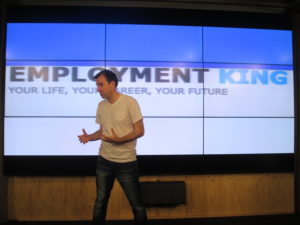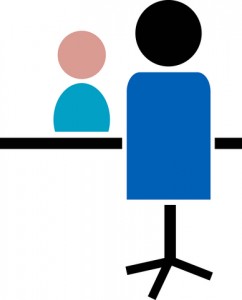The UK government is one of the largest UK employers, recruiting career professionals in a range of industries from civil engineers to job center plus staff.
Government jobs include:
- NHS jobs
- Council jobs
- Civil service positions
- Law enforcement
- Administration
- Science and technology
- Teachers
- and many more
Source: Indeed Use the employmentking search box to find specific industry job interview questions and answers.
Total jobs stated that the average government job salary is £37499 but this is broad average and salary potential depends on the position and job location.
In short, there are a high number of government jobs across the UK with varying salaries.
For a successful job interview outcome, job applicants need to understand how the interview panel views them as employable or unemployable – the job applicants interview identity.
For high skilled roles; engineering, scientist, councilor, teacher, interviewees must be seen as high experience with a high level of confidence – a self assured interview identity or higher.
Step one: take the interview identity test.
For most government positions, applicants will be asked several questions to check elgibaility:
- Do you have a criminal record?
- Are you a UK resident?
- How long have you resided in the UK?
- Does any of your family work for (government) department?
- Do you have a (sector related) qualification?
Government hiring managers use a panel interview to create a fair recruitment process, all following the structured job interview process.
It is the structured job interview process, asking each applicant the same interview question in the same order and cross-referencing each answer against the job criteria on the interview scorecard, that helps the employer predict the job performance of each interviewee.
The interview panel, often 3-5 hiring managers, will receive a blind application. Information that can create an unconscious bias; applicants age, gender, religion, name of university, disabilities, attended is deleted from the application form.
The removing of non-job related information is designed to create a fairer interview process.
Government recruitment processes can have at least 3 interviews:
- Shifting interview – often a quick 15 minute telephone or video interview to check suitability
- Panel interview – a structured job interview often consisting of around 8-10 job interview questions
- Final interview – delivered often by a senior staff member to check skill level for the advertised role
Each individual position will have various job interview questions. Governemnt recruiters are trained to put job applicants at ease by creating a conversation prior to the start of the job interview.
The following questions that may be asked wont be scored on the interview scorecard. Instead, they are designed to get the job candidate to relax.
- Did you have any trouble finding the office?
- How was the drive over?
- How was your weekend/week?
The hiring manger will then explain the government interview procedure. they will cover:
- The duration of the interview
- The number of questions that will be asked
- The structured interview process
- Who in the interview panel will ask what
- That questions can be repeated
- And that there will be a chance for the interviewee to ask the interview panel questions
There will be a mixture of generic and job specific interview questions.
Generic job interview questions
- Tell me about your experience and how to relates to the role?
- What are your greatest strengths?
- Where do you see yourself in 5yrs time?
- Tell me why you applied for this position?
- What have you done to develop yourself in the past 12 months?
Industry specific job interview questions
- Give me an example of completing (job task)?
- What would you if (sector related problem) occurred?
- Do you have an example of collaborating/working within team?
- What does (sector related term/technology) mean to you?
- If you where working on (job task) and (problem) happened, what procedure would you follow?
Why a government role interview questions
- Tell me about your first government position? (often used internal progression job interviews)
- What has inspired you to work for the government?
- What do you think working in a government department would be like?
- Do you know the mission of this government department?
- How did you find out about the (government) department?
Government interview questions and answers
Why have you chosen to apply for a government position?
Hiring managers want to hire skilled applicants who have an ambition to work for the government, compared to just wanting the role, as the outcome is often a highly-motivated team.
Interview Template:
“I have always wanted to work within a government department, so that my skills can be used to make a difference to improve the lives of the public. I have a wide range of experience related to the (position) which includes (detail experience related to the job criteria). I know that together we will be able to achieve the (department objective)”

What made you apply for a position in this department?
Employers need to know that a potential employee has the skills, knowledge and experiences to be a virtual part of the team. This question is more about the actual duties, rather then answering the question focusing on why you applied for a government role. As an example, a civil engineer would answer by relating to engineering experience more then wanting to be part of the civil service.
Interview Template:
“With over X number of years experience working as a (job role) I am also qualified as a (state qualification). My previous experience include (state job duties and responsibilities) I am always drawn to roles that meet my skills and experiences, but that can also challenge me. I applied specifically for this department because (give reason).”
What do expect to do on a daily basis?
Questions relating to business-as-usual tasks are designed to test competencies and knowledges. Only a skilled and experienced career professional will have a deep understanding of the role. The more an applicant can express knowledge of the job role the higher they will be scored on the interview scorecard.
Interview Template:
“The 3 main responsibilities for this role include (A, B and C) To ensure that I meet my job objectives I would, on a daily basis, focus my time and energy on (duty one – detail required actions, duty two – detail required actions, duty 3 – detail required actions). In addition, I know there will be times when i will be required to (additional task), for this part of my job I would reply on my previous experience of (add past experience) with will allow me to (actions you will take) Overall I am highly experienced in this line of work and can take on any tasks relating to this position.”

Do you have any questions for us?
- Could the department be effected by any upcoming elections or budget cuts?
- How do collaborate with other government departments?
- How is success measured within the department?
- Do new staff undertake any training?
- Why do you enjoy working in a government department?


















